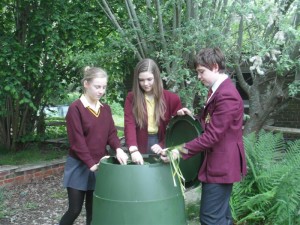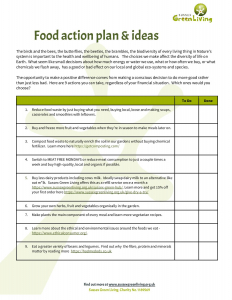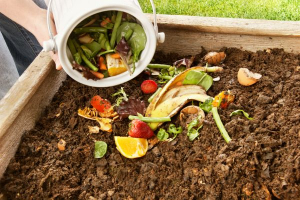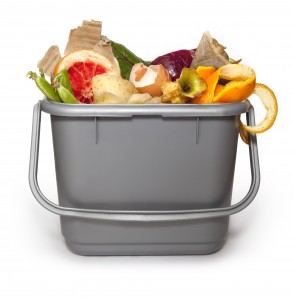At home or school – get composting!
What is compost?
Compost is nature’s own fertilizer and is full of all the nutrition plants need to grow healthily. It is made from food and garden waste that is broken down into valuable nutrients by bacteria, fungi, insects and other animals that live in the soil. These nutrients can be added back to feed your plants by spreading the compost on your garden beds or digging it into the soil where your plants need a boost. Just like you need healthy food to grow strong and keep you healthy, plants need it too. Compost is healthy plant food!
Why do it?
Composting has many different benefits and advantages here are a few of the ways composting and compost can help nature, the environment and your pocket:
- Improving soil structure and moisture – organic material feeds the worms in the soil and encourages them to move through making air pockets and breaking up heavy soils that are hard for plants to push their roots through. It also holds water like a sponge when it rains, holding water in the soil makes it available for plants to grow strong and healthy. The result is stronger healthier plants and more worms for the birds to eat!
- Reduces waste going to landfill – In the UK 9.52 million tonnes of food waste is thrown away each year. Most of this ends up in holes in the ground (landfill). This mixed with other non-food waste produces methane gas and a nasty black liquid called ‘leachate’ which can seep into rivers and groundwater harming water life if not managed properly. Taking the food out first and composting it means less leachate to seep out into our rivers, keeping river life healthy and strong and supporting the birds, fish and other animals that live there. For more facts and figures about this please visit the eco experts website.
- Compost is free – Why spend lots of money on compost from the garden centre when you can make your own for free with just a bit of time and patience?
- Compost piles support life – Lots of creatures don’t have a warm home in the winter. As the food waste is broken down it releases heat. Compost piles in the garden can provide warm places for creatures to overwinter, like shews, mice, slow worms, insects and beetles.
Where to compost
The best place to site a compost bin is in a sunny, well drained area, out of the wind. Put your composter in the garden on bare soil and not on paving or decking (as it stops the worms from getting in). If you place it in the shade the compost will take longer to break down. Heat from the sun in the summer speeds up the composting process.
What types of composters are there?
There are many different types of composters, and various different price scales. However, you don’t have to buy one, you could make one out of discarded wood pallets or chicken wire (open compost bins), or a few old buckets with holes drilled in the bottom (wormery and bokashi style).
If, however, you did want to splash out and buy one ready made county councils often sell them at a discounted price to encourage local residents to compost and reduce the amount going to landfill. Information about the latest offers and reductions.
I don’t have a garden, can I compost?
Yes, you can. There are now compost bins and wormeries that you can keep on a window sill or in a garage. Bokashi bins are small self-contained compost bins that use anaerobic fermentation to break down the food scraps instead of worms. Find out more about bokashi bins. You may also try having a wormery. You can use the worm compost it produces to make a fertilizer to feed all your indoor plants.
What can I put in my compost?
You can use a whole range of things to make compost: garden waste (e.g. fallen leaves, grass cuttings and prunings) and kitchen waste (including raw vegetables and fruit, crushed eggshells, tea & tea bags) are the most common ingredients but why not also try:
- shredded paper and cardboard (no one will ever read those old bank statements!)
- chopped straw and hay e.g. animal bedding
- human hair and animal fur
Most weeds and seeds can be put on compost heaps as they will be killed by the heat produced during the breaking down process, but try not to include invasive plants like bindweed, Japanese knotweed etc.
Do not however add any of the following to your compost heap as they may contain bad bacteria or be attractive to pests like rats.
- cooked foods
- meat, fish or dairy products
- ash from coal fires
- dog or cat poo
- nappies or used tissues
The Exception to the rules
Hot bins have the added advantage of being able to take food waste that is not normally included in compost. Hot bins can take cooked food waste, bones and animal waste and turn it into great compost in as little as 1-3 months. The insulating properties of these bins means the temperatures inside the compost can reach 60˚ C which are high enough to kill off bad bacteria, and break down even the most stubborn items. More information and Horsham district council offers on hot bins.
How to make compost
Add the compost ingredients to the compost bin or heap, mixing the different types of materials together with a garden fork as you do so. It’s a good idea to add both green and brown waste to make a balanced compost. Green = fresh food scraps and grass. Brown = wood chips, paper and torn up cardboard.
When is it ready?
Compost usually takes between 6 and 12 months to make, although it can take longer than this, especially in cold weather. Your compost is ready when it is dark in colour and has an earthy smell. You can speed up the process by turning your compost and keeping it moist (but not wet).
When the compost appears to be ready, take some from the bottom of the pile, put it on your garden and watch those plants grow!
You can learn about other ideas for reducing food waste here.





